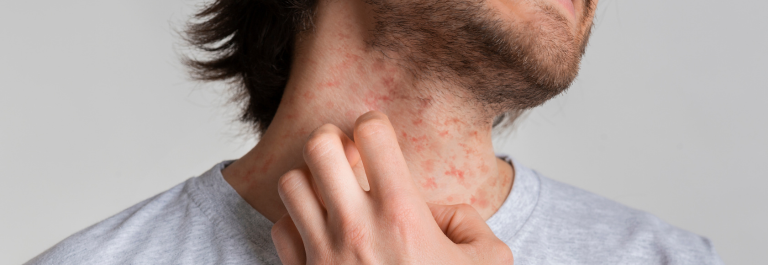Are you wondering why your baby's skin has broken out in red flares? It could be infantile eczema.
It can be troubling to see your little one struggling with this itchy rash, and that's why we're here to tell you everything you need to know about:
-
The causes of baby eczema
-
Infantile eczema symptoms
-
How to treat your baby's skin naturally and effectively
Keep reading to learn more about how to tackle your baby's eczema today.
What is Baby Eczema?
Affecting up to 13% of all children under 18 in the United States, eczema is a chronic condition characterized by repetitive cycles of flare-ups and remission that may continue throughout your child's life.
Typically, eczema tends to develop in early childhood, with 60% of all patients experiencing their first flare-up before their first birthday.
Did you know that 'eczema' is an umbrella term for multiple related skin conditions? While eczema atopic dermatitis is the most common, babies may also be affected by allergic contact dermatitis, seborrheic dermatitis (or cradle cap), and dyshidrotic eczema.
Causes of Baby Eczema
Eczema is believed to be caused by a combination of genetic and environmental factors. Cases are more likely amongst babies with a family history of the skin condition and, therefore, carry an atopic genetic predisposition.
For babies with eczema, an overreactive immune system in response to environmental factors impedes the skin barrier's ability to hold and retain moisture causing dry skin.
Common eczema triggers include pet dander, fragrances, skin irritants within skin-care products, harsh laundry products (choosing a gentle detergent for sensitive skin can help), dry air, and itchy fabrics such as wool.
Food Allergies
The atopic gene is also responsible for asthma and hay fever, meaning infants developing eczema are more likely to suffer from allergies.
Indeed, studies have shown that food allergies are a factor in 30% of young children with eczema, with cow's milk and eggs being the main culprits. In these cases, an allergic reaction worsens your baby's symptoms, exasperating their skin inflammation and triggering increased itching.
When diagnosing food allergies and eczema flare-ups, your child's doctor may suggest removing certain foods from their diet and reintroducing them once the immune system has had time to recover. To ensure you're safe, we urge you to consult your pediatric dermatologist before making any dietary changes.
What Does Baby Eczema Look Like?
-
Itchy skin that appears red on lighter-toned skin or as hyperpigmented patches on darker skin. Red patches may also be dotted with small bumps
-
For infants, eczema most typically affects the eyelids, scalp, baby's cheeks, and diaper area. Around the age of two, your toddler's eczema is more likely to appear in the creases of the elbows and knees or on their wrists, ankles, and hands
-
A cradle cap is characterized by greasy, yellow scales across the scalp
-
Children with eczema are more prone to skin infections and skin damage. This is because eczema's effect on the immune system makes it easier for bacteria, viruses, and other germs to get inside the body
-
Symptoms may differ from baby to baby, depending on whether they are experiencing mild eczema or severe symptoms
Natural Ways to Soothe Baby Eczema
Especially for new parents, it can feel overwhelming to know where to start when treating your baby's eczema with the right eczema cream for babies. You may have tried topical steroids but want to find a more natural eczema cream solution alongside steroid cream. Thankfully, you can start doing many things today to prevent flare-ups and soothe your child's sensitive skin.
Prevent Scratching
One of the most troublesome symptoms of eczema is the constant itchiness, which might be keeping your little one (and you!) awake at night. This is because, over time, scratching causes skin damage, weakening the skin barrier and making dry skin worse.
To stop your child from aggravating those itchy patches even further, try these 100% Cotton ScratchSleeves with Scratch Mittens. Made with 100% stretch cotton, these stay-closed scratch mittens for babies are specifically designed for older babies and children to help protect delicate skin from relentless scratching and give your child's body the time it needs to heal.
Keep the Skin Moisturized
Emollients provide a surface film of hydrating oils across the skin barrier, helping to soothe dry skin and reduce the symptoms of atopic dermatitis.
If you're looking for a fragrance-free moisturizer that's safe for even the most sensitive skin, consider a gentle beef tallow cream or look no further than the Baby & Adult Soother. Made by an acupuncturist for his daughter's eczema, this itchy eczema treatment by Emily Skin Soothers contains only the most natural ingredients of the highest quality.
You can even melt this cream down as a gentle treatment for cradle caps.
To treat severe eczema, apply generously after bathing your baby with a gentle eczema soap to lock in even more moisture. (Be sure to use lukewarm water, as heat can make eczema worse).
Wear Gentle Garments
While that chunky-knit cardigan may look very cute on your little one, itchy fabrics may worsen their eczema rash.
Try to find hypoallergenic, gentle garments instead. For nighttime, we'd recommend the Cotton ScratchSleeves Baby Eczema Pajamas. These ScratchSleeves baby eczema pajamas offer cotton stretch with stay-closed silk mitts and booties to reduce itching from their fingers and toes.
Soothe your Little One's Skin Today
For parents of a young child, an eczema diagnosis can be daunting. But follow these steps to find peace of mind and treat your child's eczema today.



